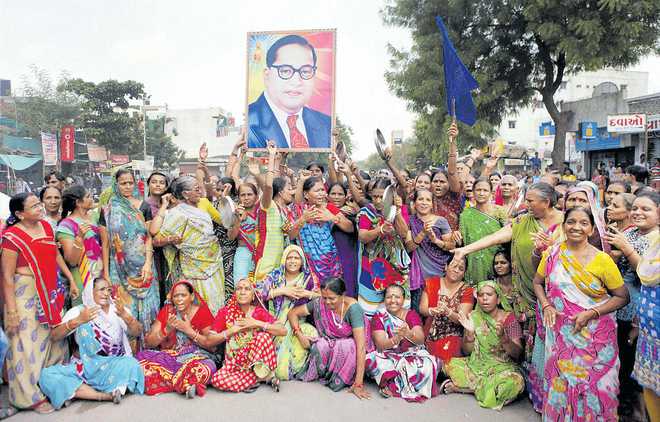
On the Margins: Dalits are also economically disadvantaged. Women members of the Dalit community carry a portrait of BR Ambedkar during a protest in Ahmedabad against the assault on Dalits by cow protectors in Rajkot district, Gujarat.PTI
Pritam Singh
BR Ambedkar, the chief framer of the Indian Constitution, was also an original economic thinker. The originality of his economic thinking can be interpreted as eclecticism due to his non-adherence to any one particular economic ideology — Marxism, neo-classical economic thought, support for market economy or state regulation. However, behind his eclecticism lies a common running thread in his ideas on different economic issues. That unity was provided by his concern for the Dalit sections of Indian society.
In adopting this approach, he can be compared with Karl Marx who was ruthless in his rigorous analysis of capitalism. That rigour was not merely an academic enterprise but closely linked with defending the interests of the working class. In both cases —Marx for the working class and Ambedkar for the Dalits — there was no compromise in the objective analysis of the economic conditions to suit any partisan considerations.
On the contrary, both viewed a scientific examination of the economic conditions as a necessary condition for advancing the interests of the working class and the Dalits (for Ambedkar). In the Indian context in particular but South-Asian context in general, the social categories of class and caste overlap and interpenetrate each other despite the autonomous status. Three main issues on which Ambedkar focussed his intellectual energies were: monetary circulation in the economy, size of land holdings as a part of the broader agriculture strategy and public finance especially the pattern of federal finance.
In his writings on money, he directly challenged the dominant Keynesian view in the 1930s regarding the delinking of supply of money from gold reserves. Keynes had argued that due to the development of the monetary- exchange mechanism in advanced capitalist economies such as the UK, there was no need to limit the supply of money by linking it with the gold reserves. Ambedkar opposed this view not because he had any special fascination with gold but because he considered that delinking of money supply from gold reserves would open the possibilities of excessive supply of money. This, in turn, could lead to financial instability and inflation. From the viewpoint of the poor sections of society, Ambedkar thought that both inflation and financial instability would hit them adversely. The rich might benefit from financial instability by using a range of alternative investment options. The 2007-8 financial crisis of the global capitalist economy, triggered by unregulated financial markets and resulting in huge income and wealth inequalities, is a testimony to Ambedkar’s prophetic insights. For him, the seemingly technical question of money supply and gold reserves needed to be assessed for how these impacted the welfare of Dalits who constituted the bulk of the poorer segment.
Ambedkar adopted the same method to assess the conditions in India’s rural economy. He argued that fragmentation of land holdings in India was leading to decreasing the average size of land holdings to an economically inefficient level. He advocated consolidation of landholdings in order to increase the average size of a farming unit. On the face of it, this may seem against the interests of small landholders. However, from the viewpoint of economic efficiency, he did not consider the defence of uneconomic landholding size was in the interests of poor peasantry or landless workers. He, therefore, proposed cooperative agriculture which ensured pooling of smaller units into a bigger unit to avail of the economies of scale. In his view, cooperative farming was desirable for small landholders and landless workers who were mostly Dalits. In looking at alternative modes of farming and suggesting cooperative farming as the most-desirable system, Ambedkar’s goal was the defence of the economic interest of the Dalits.
The third major issue Ambedkar examined was the question of public finance, dealing with revenue and expenditure of different layers of governance. His basic premise was that each level of government needed to have appropriate sources of revenue to meet its expenditure obligations. He further argued that along with the quantitative dimensions of revenue and expenditure, it was necessary to examine the qualitative dimensions of the revenue-expenditure pattern. A government may be able to generate generous revenue but it might fritter away that revenue through unproductive expenditure such as luxury spending by ministers and government officials. In contrast, even a modest increase in revenue if spent on public goods such as health and education can have a multiplier effect on improving the quality of life. The provision of such public goods is especially important for the Dalits and other pooper sections of society.
Ambedkar also examined the impact of centralisation versus decentralisation on the life conditions of Dalits. From one angle, he seemed to be supportive of centralisation but he also considered excessive centralisation as a threat. In arguments in support of centralisation, he viewed that decentralisation could empower the local upper-caste elites more against the Dalits. He viewed centralisation as creating conditions for authoritarianism that can weaken democracy.
In Ambedkar's view, the weakening of democracy was not in the interests of the Dalits. Precisely for this reason, Ambedkar opposed and defeated a proposal from Jawaharlal Nehru that India's Constitution could be amended by a simple majority in the Parliament. He viewed Nehru's proposal as paving the way for increased centralisation and succeeded in inserting that a government needed to have at least a two-third majority in the Parliament to make a constitutional amendment. In supporting or opposing centralisation, his key concern was the defence of Dalits’ political and economic interests.
All those who oppose caste and other forms of discrimination need to learn this Ambedkarite method of keeping the concerns of Dalits as the central determining criterion in assessing different policy options. In the era of global climate change, a creative development of Ambedkar's ideas is necessary to suggest sustainable and egalitarian modes of economic activities.
The writer is a Professor of Economics at the Oxford Brookes University, the UK.


























